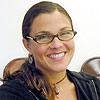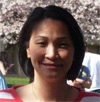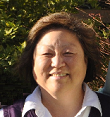Learn about our levels
Welcome to ESL at South Seattle College. If you're visiting this page, chances are good that you're new to South or interested in a position at South. One of the first things you'll want to look at are the different levels of English learning we offer. You can find level-specific information through the links below.
ESL 1, ESL 2, ESL 3, ESL 4, ESL 5, ESL 6
Dates, times, and locations of our classes
Our schedules have changed significantly during the Covid-19 pandemic, and we are still making adjustments quarter-by-quarter to our schedule. For the 2021-22 academic year, we have re-introduced some in-person instruction after over a year of 100% remote learning during the pandemic. Contact the dean for the latest details.
Prior to the pandemic, most of our ESL classes met either Monday through Thursday or Monday through Friday, and most take place on main campus, at the New Holly Learning Center, or on our Georgetown campus. Classes typically met for three hours a day, either in the mornings or evenings. As of fall 2019, our regular schedule of classes included:
- Main campus mornings, ESL 1 through 6, Monday through Thursday or Friday, 8:00 am to 11:50 am
- Main campus evenings, ESL 1 through 6, Monday through Thursday, 6:00 pm to 8:50 pm
- New Holly Learning Center mornings, ESL 1 through 3, Monday through Thursday, 9:00 am to 12 noon
- New Holly Learning Center evenings, ESL 1 through 3, Monday through Thursday, 6:00 pm to 8:50 pm
- Georgetown campus evenings, ESL 1 through 3, Monday through Thursday, 6:00 pm to 8:50 pm
- I-BEST programming in Auto Maintenance and Light Repair, CNC Machining and Welding, with I-BEST programming in Aviation Maintenance Technology and Nursing Assistant planned.
Find directions to the various campuses here.
Unless you're teaching off-site, teaching a skills class, or teaching I-BEST, your schedule likely matches one of the above. A schedule of classes is shared with all faculty at the beginning of the quarter, including dates, times, and classroom locations. More information about skills classes and I-BEST classes is provided below. (Like waayy below. Almost at the end. But it's there.)
The academic calendar
We follow the academic calendar of the Seattle Colleges. The start dates for each quarter and the holiday schedule (at the bottom of the page) are often most useful.
The division meeting (no classes on the first day)
We hold our quarterly division meeting on the first day of the quarter every fall, winter and spring--in place of classes. There is no division meeting in the summer. The meeting takes place twice, once for the day crew and a second time for the evening crew. Attendance at one of the two meetings is required as this is a paid, contract day. It's best to attend the meeting at the same time you will be teaching, so you can meet other faculty teaching at that time.
During the pandemic and through winter 2022, the meetings were held in Zoom from 9:00 to 11:30. At some point, we anticipate returning to the in-person schedule, when the meetings were held:
- 8:30 am to 11:30 am, Cascade Hall, room 107
- 6:00 pm to 9:00 pm, Cascade Hall, room 107
The meeting agenda is often, but not always, sent out the week prior.
CASAS
We receive federal funds to offer our program, and our federal reporting requires a valid CASAS pre-test and post-test. Your students will have already had a pre-test before arriving in your class, except at the Georgetown campus where CASAS testing takes place during the first week. All faculty are responsible for administering the CASAS post-test during the penultimate week of every quarter. This allows for any "make up" testing to take place during the final week, and it also allows us to use the word "penultimate," which we enjoy.
We administer these tests online, and you will receive a schedule of testing from our ESL Faculty Assessment Coordinator, Kris Lysaker. If you’re not already, you will need to become a trained CASAS eTests Proctor. You will be paid the faculty stipend rate to complete the training. The training involves two parts, one online and the other face to face. Visit our CASAS Proctor Certification page for details.
 Kris Lysaker will train you in CASAS.
Kris Lysaker will train you in CASAS.
 Gina Trinh can also answer CASAS questions.
Gina Trinh can also answer CASAS questions.
Adds/Drops and your roster
You can access your student roster through ctcLink. At the beginning of the quarter, this roster will most likely not be accurate. To meet federal requirements, our office runs our own new student intake sessions and it can take a while for the enrollments from those sessions to show up. At the start of the quarter, therefore, the BTS office will provide you with a paper roster. After the first week, please check ctcLink for accuracy, and re-check it regularly (weekly). If you cannot access your roster, or if your roster doesn't match students in your classroom, please check with the BTS office.
During the first two weeks, you will be asked to drop any no-show students and accept new students off the wait list. A few key points:
- Do not sign-in any students to your class. Send them to the BTS office. We will sign them in or place them on the wait list. If you sign a student in, you run the risk of over-filling your class. The office cannot over-ride your decision, and you may unwittingly agree to exceed your class cap (or even seats in the room!). Please don't do that.
- Do not drop any students who have attended your class for 12 or more hours, because this is the threshold at which students become federally reportable.
- Do not drop ORIA students (see more about ORIA, below) without first contacting Gina Trinh in the BTS office.
- The division runs a Gateway class that allows for late enrolling students to enter your class. You will receive notice if any Gateway students are placed into your class. This notice typically comes by the of the second week of class.
- After the Gateway students are placed, enrollment is closed--except for ORIA students (again see below). This is when your roster would be final (unless you explicitly add students), and it's usually at the end of the second week.
- The official class cap for most ESL classes is 35 students. It's the division practice to cap ESL 1 at 20 to 25 students and all other ESL at 25 to 30 students.
You may may attempt to drop a student who has attended your class for fewer than 12 hours but the BTS office over-rides this decision. This would be because the combined attendance of that student between your class and another class (such as math or GED) equals more than 12 hours, making the student federally reportable.
As a general rule, your roster will be set by the end of the second week. The major exception to this rule is placement of our ORIA students. So...
ORIA
We have specific funding from the State to serve students referred by the Office of Refugee and Immigrant Assistance (ORIA). You may have some of these students in your class. Gina Trinh (see her photo, above) oversees our ORIA contract, and she'll reach out to you with specific requests. The requests generally are:
- Attendance or other information about ORIA students
- Coordination with Gina before dropping an ORIA student
- A request to add an ORIA student to your class after the second week of the quarter
Gina is usually on top of these needs, so there's nothing specific asked of faculty other than to be responsive to her requests. Loop in the dean for any questions.
Computer Lab time
Every faculty has computer lab time. During these times, you are expected to teach the digital literacy learning outcomes from the course outlines for each class. On main campus, Daphne Guericke coordinates the computer lab schedule, and all faculty receive a copy. At New Holly, the schedule is coordinated by Carolyn Stern, the site manager.
 Daphne Guericke, Faculty Computer Lab Coordinator (main campus)
Daphne Guericke, Faculty Computer Lab Coordinator (main campus)
Attendance reporting
Per our federal funding, you are required to report student attendance. Most faculty record attendance in an Excel spreadsheet that is shared at the start of the quarter--and uploads the spreadsheet to the BTS CANVAS site when attendance is due. Gina Trinh (again, photo above) is responsible for collecting attendance every quarter, so if you prefer to submit your records in some other manner, email Gina to let her know.
Keys, copies, and general needs
Teresa Yamada completes the hiring paperwork for all new faculty. She also arranges email accounts for everyone. On main campus, Teresa can also help with classroom keys, the copy center, parking passes, or other general needs. At New Holly, Carolyn Stern is your point person.
 Teresa Yamada can help with many general needs.
Teresa Yamada can help with many general needs.
Assessment Day
Faculty have a contractual obligation to give an exam, but we don’t give exams. Instead we hold Assessment Day on the first day of exams. Assessment Day can be a class, one-on-one meetings with students or other end of the quarter activities--as long as you are on campus and providing an activity for your students. You may want to include assessment day in your syllabus. Contact the dean for the date of assessment day, or look for it on his blog.
Optional math placement for main campus, mornings
Main campus, morning students enrolled in ESL 4, ESL 5 or ESL 6 have the option to take math classes in our ABE/GED/High School completion program. Classes begin at 11 am--immediately following the end of the morning ESL sessions--and they are open to any interested students (meaning students are NOT required to be pursuing their GED or high school diploma). Interested students must attend a math placement session during the first week. Sign-up information for those sessions will be provided to you either at the division meeting or during the first week of the quarter.
Grading/Advising students
Classes are pass/fail, where students receive either an S, Y, or N grade.
- S is the pass grade, meaning a student met all the learning outcomes of their level and are ready for the next level.
- Y is the grade for students who attended and remained engaged, but who did not meet all the learning outcomes and would benefit from repeating rather than being advanced.
- N is the grade for students who disappear.
Students generally take 2 or 3 quarters to pass from one ESL level to the next, so a significant no-pass rate is the norm. Toward the end of the quarter, you will register existing students for the upcoming quarter (though some spring students will skip summer and register for the upcoming fall). At that time, you’ll need to decide if a student is ready for the next ESL level or not—and help them register accordingly. You’ll get more emails/guidance on that process, as we schedule times for faculty to bring their entire classes—during class time—to our front office to register.
Class sets
We have class sets of materials in our resource library on the third floor of Cascade Hall or in the resource room at New Holly. When faculty use a class set, they generally take the set of books to the classroom daily--and return them to the resource library daily as well. On main campus, there are carts available for moving books.
The WELL
The Writing and English Learning Lab (the WELL) offers free drop-in (or by reservation) tutoring to ESL and other students with tutors specifically focused on issues for English language learners. While it is open to all students, the WELL is located on main campus with mostly daytime (11 am to 5 pm) hours, so it's largely available to main campus morning students who stay after class or main campus evening students who come in early.
During the pandemic, the WELL continued to serve students via Zoom. There is discussion about the possibility of resuming in-person tutoring as early as winter 2022.
Faculty Professional Development Day
Once per quarter (except summer) all classes are canceled for Faculty Professional Development Day. Full-time faculty are required to attend activities that day, which might be scheduled by the dean, the campus faculty professional development coordinator, or by faculty themselves. Part-time faculty are encouraged--but not required--to attend, and those who participate in activities receive a $100 stipend. Look for emails announcing the day and activities of professional development day, and cancel your class for that day. All classes are canceled--including evening classes as well as classes at New Holly and Georgetown--even though the events of that day might not conflict with your scheduled teaching time or location. You must cancel classes this day, and you cannot "trade it" for another day.
Weekly updates
The dean updates his blog periodically. When it's updated, and email with a link to the blog is sent to the entire division. Please read these updates in their entirety. They are meant to be reasonably short and to-the-point, and they often include key information--such as how to request an assignment for a future quarter. You are responsible for knowing the information and responding to requests in the blog.
Children in the classroom
This doesn't come up a lot, but periodically students ask if they can bring their children to class. District policy states that children are allowed in the classroom on an “infrequent” basis and only with instructor permission. When allowed, it is expected that parents will maintain responsibility for supervising their children and that the children will not disrupt the learning environment.
So it's up to you, and I will support you in whatever decision you make. I personally appreciate efforts to accommodate students who need this flexibility when it is “infrequent,” and I’m glad we have this option.
Sick leave/personal day/subs
Let the office know as soon as possible if you are going to be sick or otherwise absent. Per article 4.5 in the contract, all faculty are granted one personal day a quarter. You can take this any day you like, but you are expected to let the dean know in advance. You can use this day for anything you want except gainful employment or personal employment. For part-time faculty, this is a "use it or lose it" day that does not accumulate over the quarters.
The division practice is to provide a sub on the "second and subsequent" days of an absence. So, in general, if you miss one day, there's no sub. But if you miss two or more days in a row, we bring in a sub on the second day. The exception to this is ESL 1, where we try to provide a sub on the first (and every) day. If you would like to arrange for your own sub, please coordinate with the BTS office. Otherwise, we'll find a sub for you.
Paychecks
You'll get paid on the 10th and 25th, or whatever non-weekend/non-holiday is closest to those dates. If you were hired "late," it's possible that you won't complete your hiring paperwork in time for the first pay period. Ask the dean.
Clustered classes
Clustered classes are single teaching assignments/classes designed for students from more than one ESL level. For example, our ESL program at Georgetown generally runs two clustered classes. One class covers students who place into ESL 1 and 2 as well as students who are "low" ESL 3. The other classes is for "high" ESL 3 students as well as students who place into ESL 4. You will know if you've been assigned a clustered class, and faculty who teach those classes should consult course outlines and other materials from both/all the corresponding classes.
Skills classes
In addition to the regular 3-hour per day ESL classes, the schedule sometimes gives students an opportunity to stay an additional hour for a skills class. These classes are optional and available for students who want extra practice. Pronunciation is a popular skills class. We've also offered skills classes in computer literacy, grammar/writing, and other topics.
Check the schedule for skills classes, or look for an email about them. Students often register for skills classes during the first week, and usually register by simply attending the first day. Skills classes can be limited to students at certain levels. Encourage interested students to attend and sign up.
I-BEST
Integrated Basic Education and Skills Training (I-BEST) are offerings that allow ESL students to take college-level courses that are co-taught by a "content area" instructor and a basic skills instructor. We currently offer I-BEST programs in Automotive Repair, CNC Machining, and Welding. We are approved--but not currently offering--I-BEST programming in Nursing Assistant and Home Health Aide. We expect to launch a new I-BEST class in Aviation Maintenance Technology in the spring of 2020.
I-BEST offers college-level training opportunities to students who otherwise might lack the language skills to place into these programs. I-BEST students must meet the same standards as all college-level students, but because the classes are co-taught by (for example) a welding instructor and an ESL instructor, there is extra support to ensure students can succeed.
If you're teaching ESL 4, ESL 5, or ESL 6, consider inviting Teresa Romaneschi, our ESL Career Pathways Coordinator, so she can tell you students about this opportunity. Or if you're interested in learning more about I-BEST, contact the dean.
 Teresa Romaneschi will visit your class to talk about I-BEST.
Teresa Romaneschi will visit your class to talk about I-BEST.
The BTS Faculty CANVAS page
The faculty have their own CANVAS page, where you can find more information and resources, like sick leave forms, field trip forms, the attendance template, the BTS policy manual, and more. Most faculty use the CANVAS shell to submit their syllabi and student attendance records. (Successfully submitting your syllabus earns you 100 points!) To get access to the BTS CANVAS shell, email Daphne Guericke.
Snow, Hurricanes, and World-Ending Asteroids
Sign up for the college's campus alert system, and you will be notified of any campus closure. Unless otherwise notified, any closure (or decision not to close) applies to all sites--main campus, New Holly and Georgetown. As always, when facing hazardous conditions, take whatever safety measures you feel are appropriate, and let the office know if you will be late or unavailable.
Collective Bargaining Agreement
All faculty are represented by the American Federation of Teachers (AFT) local 1789 and work under the terms of our collective bargaining agreement. The dean and the AFT are both happy to be available to provide advice on the contract, and the resources described here and elsewhere are meant to be consistent with that contract. If you'd like to see the contract for yourself, click here.
Whew!
That's it for now. I hope this gives you more than you need to have a great start to the quarter. I know you'll do a great job because you are awesome! Email the dean with any questions.
 John Bowers, Dean
John Bowers, Dean